How Schools Can Help Cultivate Learner Identity and Agency
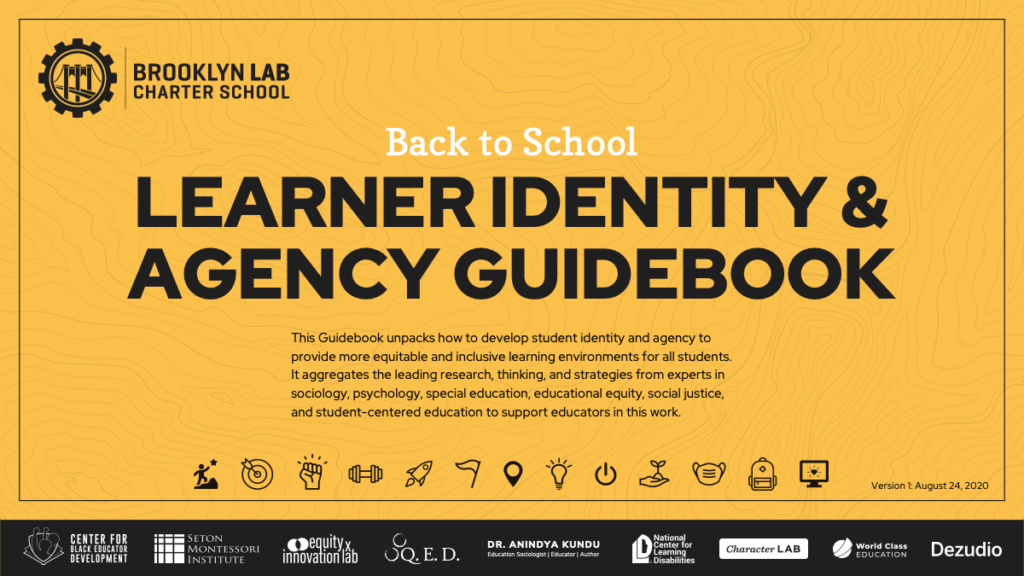
By: Anna Perry, Kim Carter, Chris Liang-Vergara, Eric Tucker, Sean Talamas, and Elliot Luscombe
COVID-19 is creating unprecedented challenges and demanding more of students, who must play an even greater role in managing their own education as they navigate in-person, hybrid, and virtual learning in varying measures throughout the year. To succeed, students will need to authentically know who they are, what they value, and where they want to go. They’ll need to leverage resources to navigate obstacles and create positive change in their education and life, investigate their interests, reaffirm their identities, drive their own learning, and grow self-motivation and resiliency.
In short, students will need opportunities to develop and cultivate a strong sense of identity and agency.
As educators, we must strive to support our students in this process. In collaboration with World Class Education (WorldClassEdu), Brooklyn Laboratory Charter Schools (LAB) asked leading educators and thinkers how schools and teachers can support students in this process: How can we help students develop their identity and agency to shift the locus of control and successfully navigate complex life and learning transitions?
Here, we provide an overview of responses from experts in sociology, psychology, special education, educational equity, social justice, and student-centered education. You can access the entirety of the contributions in our Back to School Learner Identity and Agency Guidebook.
Dr. Anindya Kundu: Fostering Social and Cultural Capital
Dr. Anindya Kundu, a sociologist of education, defines agency as “a person’s capacity to leverage resources to navigate obstacles and create positive change in their life” (Kundu, The Power of Student Agency, 2020). Dr. Kundu emphasizes two resources students need in order to foster a healthy sense of agency: social and cultural capital. 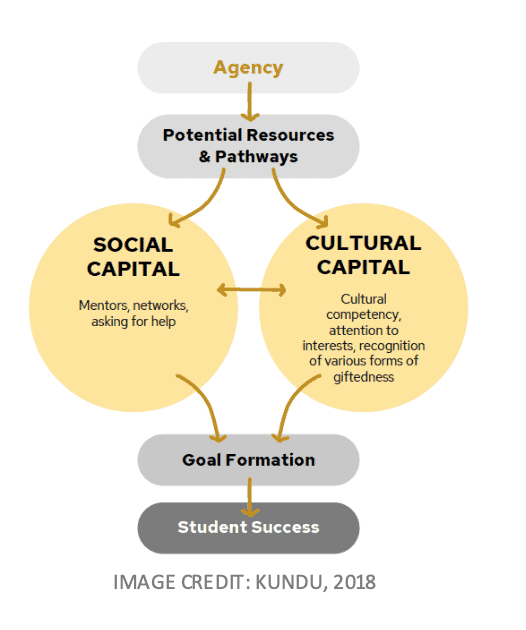
- To help students foster social capital—which includes mentors, networks, and help-seeking behavior—educators can proactively encourage students to ask for help. For students from underprivileged backgrounds, who may fear they’ll get in trouble approaching adults and others in positions of authority, it’s important to make sure these sources of social capital are safe.
- To help students cultivate access to cultural capital—the mentors and teachers who understand and affirm a student’s background and identity—educators can start by recognizing and paying attention to forms of giftedness that aren’t always appreciated in traditional education settings. Dr. Kundu shares the example of a student named J. Stud, whose teacher noticed his talent for writing rap lyrics. She arranged for J. Stud to record one of his songs in a real studio, where he ended up securing an internship.
Q.E.D. Foundation: The Importance of Emotion in Learner-Centered Education
At Q.E.D. Foundation, Executive Director Kim Carter and her colleagues are focused on a learner-centered approach to education, which recognizes that learning is responsive to the individual learner’s needs and strengths. Without the freedom to investigate their own interests in school, students might struggle to remain fully engaged and motivated. Standard curricula can prevent students from deep learning that fosters the development of their sense of identity, agency, and self-motivation skills that will be useful throughout their lives.
Q.E.D. has developed a set of tools to remain connected to their students remotely and sow the seeds of agency and self-advocacy. For example, to create space for emotion and help students remain emotionally connected to school, Q.E.D. has created an “end-of-day portal” as a standard part of its English curriculum. At the end of every day, students are expected to journal. They can write about whatever they like, and Q.E.D. hopes they use the portal as a means to advocate for themselves: to complain, negotiate, challenge, and celebrate. Q.E.D. has set a target of getting 80 percent of students to submit journals, which the writing faculty can access to acknowledge and comment on specific points made by their students. In this way, the faculty and students are forging bonds of mutual trust and understanding.
National Center for Learning Disabilities: Cultivating Self-Advocacy by Students with Disabilities
At the National Center for Learning Disabilities (NCLD), Director of Innovation Ace Parsi asks: “How can a student who comes from a position without privilege learn to advocate for themselves to a person who has privilege?”
NCLD concludes that self-advocacy consists of four components:
- Knowledge of yourself and your needs
- Knowledge of your rights
- Communication of your needs and rights to those in power
- Advocating for the rights of your group
The struggles of marginalized students are exacerbated by the COVID-19 pandemic, racialized violence, and the economic downturn. In a traditional classroom setting, these students might get by by “faking it,” which Parsi said is a sign the educational system must change. Instead, the system should provide avenues for these students to understand and communicate their needs. Parsi and his colleagues recommend schools apply a set of guidelines called Universal Design for Learning (UDL) from CAST. These ensure flexibility in how students access material, engage with it, and show what they’ve learned.
The Center for Black Educator Development: Ensure Equity in Recruiting, Training, Hiring Diverse Educators
To cultivate stronger student identity, students must be able to see their lived experience reflected in their educators, says Sharif El-Mekki, CEO of The Center for Black Educator Development (CBED), whose mission is to ensure equity in the recruiting, training, hiring, and retention of quality educators who reflect the cultural background and share the socio-political interests of the students they serve.
El-Mekki and his colleagues are creating a workforce of diverse Black, Indigenous, and People of Color (BIPOC) educators through a four-part program that focuses on the pathways to teaching, professional learning, culturally informed pedagogy and policy changes. As part of its educator training, CBED targets 5 professional learning outcomes:
- Achievement: What are the skills and competencies I need to meet that are aligned to my work and role?
- Cultural Competence: What is my history and my current experience? What is the history and current experience of those around me?
- Critical Consciousness: What is structural inequality and oppression? How have I and others contributed to it?
- Servant Leadership: How do I act as an individual and as part of a collective to enact social justice for those who have experienced structural inequality and oppression?
- Healing Practices: How do I bring restoration to those who have been oppressed, even when I have contributed to the oppression? How do I pursue and receive my own healing?
These core competencies are beneficial to Black students and all students because they help educators acknowledge and lift up student identity.
Equity x Innovation (eXi): Student-Led Solutions
Within the same lens of racial identity and agency, Dr. Temple Lovelace, an associate professor of special education at Duquesne University, has devoted herself to providing opportunities for youth to organize and redesign inequitable programs, policies, practices, and spaces in their schools and communities. She and her team developed a teacher-powered, youth-led model called Education Uncontained, which follows three key steps: First, there’s a learning exchange, in which students and teachers engage together around issues of equity, relationships, school structures, and activism. The next step is dedicated to exploration and design, where students take the lead in designing and prototyping a project identified and defined by students. The final step is implementation: when students pilot, roll-out, and then promote the project. 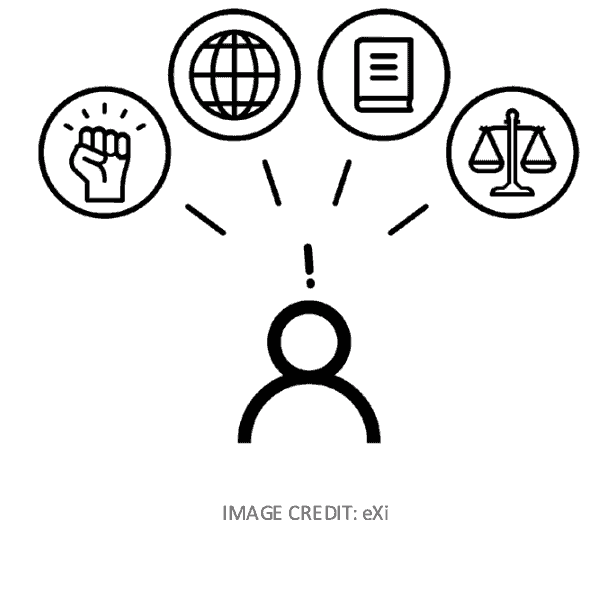
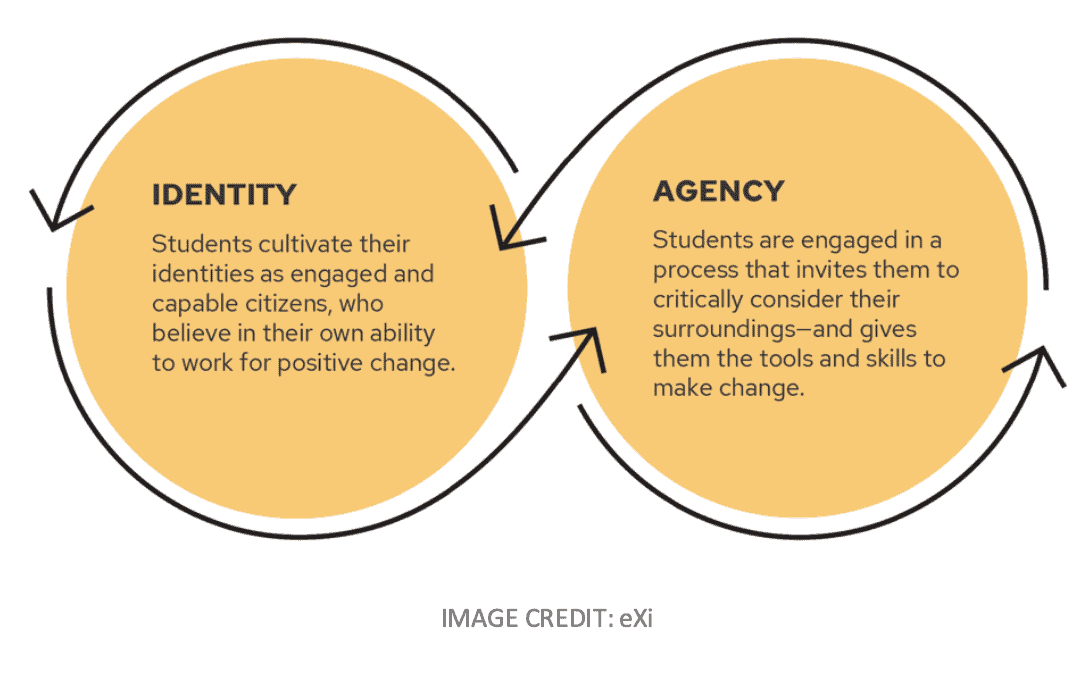
In this model, teacher-powered, student-led, real-world projects can help students feel represented and foster agency. This process can create novel solutions in this time of uncertainty and the new challenges of COVID-19.
Character Lab: Building Learner Identity and Agency Through Character
Angela Duckworth, the University of Pennsylvania researcher and author of Grit: The Power of Passion and Perseverance, co-founded the nonprofit Character Lab to help educators understand the conditions that support social, emotional, academic, and physical well-being for young people. Character Lab believes that character—the strengths of heart, will, and mind that we use to help ourselves and others—is a critical component of student agency.
Character Lab has developed a series of Playbooks that teachers can use to help students strengthen their character. Each Playbook, authored by leading scientists, contains definitions of different traits, with tips on how to begin conversations with students, and additional resources and supports to help implement changes. The Playbooks contain lessons on everything from how to cultivate purpose—how to make a meaningful contribution to the world—to how to cultivate curiosity and build self-control.
The Montessori Method: Cultivating Agency in Young Students
Often, discussions about building agency focus on older students, but educators like Anna Perry, executive director of Seton Montessori Institute and Schools, have discovered the importance of cultivating the inherent agency of even the youngest of learners. In Montessori classrooms, children become self-regulated through concentration on stimulating self-chosen tasks, or “works,” that they can pursue.
Montessori educators have developed a set of three approaches to foster agency in young students. Through mixed-age groups, teachers look at each student as an individual, and peers are empowered to become one another’s guides. Through individualized education, teachers focus on what individuals students (rather than the cohort or the label) need to learn and grow. Through the concept of “independence, situated within interdependence,” students learn responsibility for themselves while maintaining respect for others.
A Strong Foundation for a Challenging School Year
This may be the most challenging year school communities have ever experienced. As educators, we need to equip students with a strong foundation to face the many uncertainties and changes they’ll need to overcome. A strong sense of identity and greater agency will help all students, especially those who tend to be most marginalized by education systems.
As educators, we should be asking ourselves how we can ensure that students can access the resources and tools they need. How can we help them achieve a strong sense of self and cultivate in them the strength and agency to advocate for themselves and ask for what they need?
As the Q.E.D. Foundation’s Carter says, “The best antidote to hopelessness is being able to take some action.” We hope the Back to School Learner Identity and Agency Guidebook serves as a foundation to take actionable steps that help improve learning experiences for all students and deliver a more equitable educational experience during this unprecedented time.
For more, see:
- Schools Need a Success Coach for Every Learner
- Preparing to Reopen: Six Principles That Put Equity at the Core
- To Reopen, America Needs Laboratory Schools
- How to Reopen Schools: A 10-Point Plan Putting Equity at the Center
- Reopening Schools: A Scheduling Map for Educators to Plan the Who, What, When, Where, and How of Learning this Fall
- The Front Porch: A New Approach to Support the Health, Safety, and Well-Being of Our School Communities
- Safeguarding Back to School: Preparation for a Healthy Return to School in Downtown Brooklyn
Anna Perry is Executive Director of Seton Montessori Institute, a professional school and research organization that prepares new educators and provides continuing education to Montessori professionals in the United States and throughout the world.
Kim Carter is Executive Director of Q.E.D. Foundation, an organization of adults and youth working together to create and sustain student-centered learning communities. Find Kim on Twitter at @KimQED.
Chris Liang-Vergara is Founder & Partner of World Class Edu, an organization dedicated to spreading the joy of learning to every person in the world through collaboration, innovation, and equity. Follow Chris on Twitter at @LiangVergara.
Sean Talamas is Executive Director of Character Lab, a nonprofit organization that connects researchers with educators to create greater knowledge about the conditions that lead to social, emotional, academic, and physical well-being for young people throughout the country.
Elliot Luscombe is Director of Strategic Partnerships at Character Lab.
Stay in-the-know with innovations in learning by signing up for the weekly Smart Update.




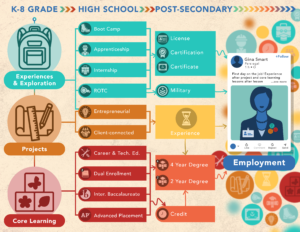

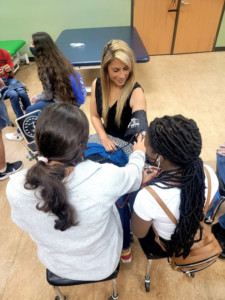

0 Comments
Leave a Comment
Your email address will not be published. All fields are required.